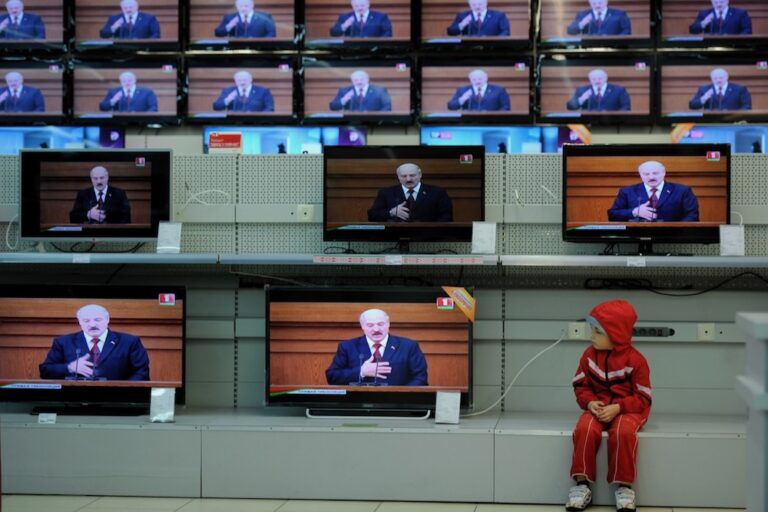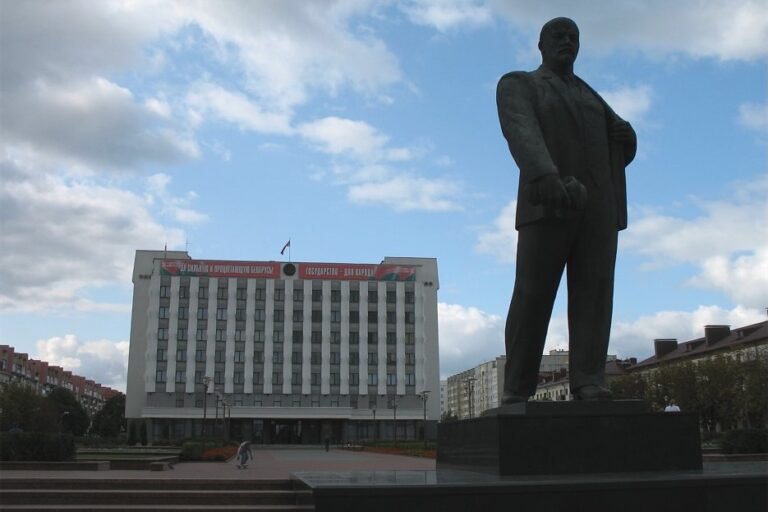(ARTICLE 19/IFEX) – This year the Belarusian authorities have taken four further incremental steps which tighten the ratchet of official control over non-state media. **For further background to cases, see also IFEX alerts dated 27 May, 9 April and 2 February 1998, among others** * BAN ON PROVIDING OFFICIAL INFORMATION: In March an internal government […]
(ARTICLE 19/IFEX) – This year the Belarusian authorities have taken four
further incremental steps which tighten the ratchet of official control over
non-state media.
**For further background to cases, see also IFEX alerts dated 27 May, 9
April and 2 February 1998, among others**
* BAN ON PROVIDING OFFICIAL INFORMATION: In March an internal government
instruction banned ministries and state bodies from passing official
documents to non-state media and prohibited state institutions and
enterprises from advertising in those media.
While the media have in practice faced obstruction in obtaining official
information before, this instruction gives official legitimation to such
obstruction from the highest levels of government. A number of non-state
media have already been denied access to information, apparently on the
basis of this instruction. In one such case a correspondent was denied
information about the continuing aftermath of the Chernobyl catastrophe.
This prohibition bars non-state media from access to a wide range of
information which they need in order to function effectively. With the state
still so predominant in Belarus, its scope extends, for example, to
information about state sector commercial institutions. For the same reason
the prohibition on advertising could severely disadvantage non- state
media — indeed, the instruction indicates that this is its very purpose.
* LICENSING LEGAL INFORMATION: In January the government decreed that
distribution of legal information such as texts of laws or government
decrees would now require a licence. Regulations for this were issued in
March. The licence conditions are onerous and provide considerable scope for
licences to be refused or withdrawn.
To qualify, a newspaper must have staff specialists with higher legal
education. Copies of their diplomas must be submitted with the licence
application and the authorities interview those staff to determine the level
of their professional training. Numerous other supporting documents must be
submitted also. The authorities can demand any other supporting documents
they deem necessary, and may arrange for an expert assessment, at the
applicant’s expense, to determine whether the licence requirements are met.
Licences can be withdrawn for, among other things, breaches of the
regulations or dissemination of unreliable information.
The regulations are directed at non-state media – state sector media are
evidently exempt. The onerous conditions — and particularly the
discretionary requirements – could provide considerable scope for
politically-motivated delay and interference in the licence allocation
process.
* LAW ON PRESS: Amendments tightening the already restrictive Law on Press
came into effect in January. These include:
scope
to arbitrarily refuse registration or to suspend media on wide-ranging
grounds;
the
Press in formulating and implementing state media policy, regulating the
media, and deciding on registration and on alleged infringements of the law;
and giving it the power, on its own authority, to suspend a publication for
up to three months;
prohibiting media being used to publish “information damaging the honour and
dignity of government officials”;
import, export or distribution of material deemed to breach the content
restrictions in Article 5.
* PRESS COUNCIL: A new “Public Council on implementing the Law on Press” is
tasked with assessing whether published material violates the content
prohibitions in that Law’s Article 5. Its 23 government-appointed members
include civil servants (including the official who in March issued the
instruction banning provision of information to non-state media), and
editors of state sector media. No editors of non-state media are included,
and there are no evident guarantees of this body’s independence from
government.
As a body whose stated purpose is to take part in implementing the
restrictive provisions of the Law on Press, it amounts to an official
censorship body in all but name.
This fourfold escalation in official control over the media has followed the
November 1997 closure, even in the absence of such additional controls, of
the non-state newspaper “Svaboda” on account of its having published
material deemed to breach the prohibitions in Article 5 of the Law on Press.
RELEVANT INTERNATIONAL HUMAN RIGHTS STANDARDS
Covenant on Civil and Political Rights (ICCPR) to comply with the provisions
of that treaty.
of expression”. It states explicitly that the right to freedom of expression
includes the freedom not only to impart, but also to seek and receive
information.
receive information and ideas of all kinds from a diversity of sources. This
implies a corresponding obligation on governments to ensure that the media
can operate freely.
By discriminating against non-state media, the recent measures severely
hamper media freedom, and so restrict the exercise of this right.
* Media freedom is recognized by international human rights bodies as an
important guarantee of the right to information in Article 19(2) ICCPR. This
means the media must be allowed freely to report on matters which public
have a right and a need to know, especially information about public affairs
and the workings of government.
By refusing non-state media such information at source and controlling their
dissemination of legal information, the authorities are obstructing the
media in their essential function of facilitating the free flow of
information about the workings of government.
* Article 19(2) ICCPR states that the right to freedom of expression and
information applies “regardless of frontiers”.
The restrictions on distribution of foreign periodicals and the import and
export of material deemed to infringe the content restrictions in Article 5
are in breach of this provision.
* Article 19(3) ICCPR states that any restrictions on freedom of expression
and information “shall only be such as are provided by law and are
necessary” for achieving certain specific purposes – “a) respect of the
rights and reputations of others; (b) the protection of national security
or of public order, or of public health or morals”. The European Court of
Human Rights has ruled that the notion of necessity in this context requires
a demonstrable “pressing social need”.
The prohibitions in Article 5 of the Law on Press, and the new controls on
the dissemination of legal information, go well beyond these or similar
criteria.
* It is well established in international human rights law that the right to
freedom of expression includes in particular the freedom to criticize the
government and to express political views, and that there must be more
leeway to criticize government or public officials than private individuals.
The special protection for the honour and dignity of government officials in
recent amendments to the Law on Press clearly breaches this important
principle.
* Belarus acceded to the CSCE (now the OSCE) in January 1992 and accepted in
their entirety all commitments and responsibilities contained in CSCE
documents. This includes the Concluding Document of the CSCE 1989 Vienna
meeting which
declared states’ commitment “… in accordance with the [ICCPR] … and …
relevant international commitments concerning seeking, receiving and
imparting information of all kinds, [to] ensure that individuals can freely
choose their sources of information.”
If non-state media are denied or restricted in their access to and
dissemination of official information, people in Belarus will be unable to
“freely choose their sources of information”, as the Belarus government has
undertaken to ensure here.
RECOMMENDATIONS:
*The ban on providing official information to the non- state media should be
removed immediately. All officials should be instructed without delay to
give the media full access to information without discrimination between the
state and non-state sector.
*The prohibition on state bodies advertising in non-state media should be
annulled. Such advertisements should be placed on a fair and equitable basis
without discrimination against non-state media and according to appropriate
professional or commercial criteria.
*The licensing requirement for dissemination of legal information and the
associated regulations should be withdrawn.
*The amendment to Article 5 of the Law on Press, and other provisions giving
government officials special protection against insult or criticism, should
be repealed.
*The amendments to the Law on Press restricting import and export of
materials and distribution of foreign periodicals should be repealed or
drastically amended to comply with the requirements of international human
rights law.
*A Press Council or similar official body should comprise members
representative of the different sectors in society, whose terms of tenure
provide the strongest possible guarantees of independence from government.
Its role should be to promote freedom of expression and information in
accordance with international human rights standards.
The new press council plainly does not meet any of these criteria.
(ARTICLE 19 has recently issued a paper describing these developments in
more detail.)
Recommended Action
Send appeals to authorities:
members of the government as indicated below
Appeals To
It is requested that copies of such letters be sent also to the Belarus
ambassador or other Belarusian diplomatic representation in your country
President Alexander Lukashenka
pl. Nezavisimosti, 220010 g. Minsk
Fax: +375 17 223 58 25 / 226 06 10
Fax: +375 17 222 38 72 / 222 32 84
Sergei Ling
Prime Minister and Chairman of Council of Ministers
House of the Government (Dom Pravitelstva)
Sovietskaya 10, 220000 Minsk
Fax: +375 17 222 66 65
Ivan Antonovich
Minister of Foreign Affairs
Ul. Lenina, 19, 220030 g. Minsk
Fax: +375 17 227 45 21
Mikhail Padgainy
Chairman, State Committee on the Press
Pr. Masherova 11, 220617 Minsk
Fax: +375 17 223 58 25 / 223 34 35


